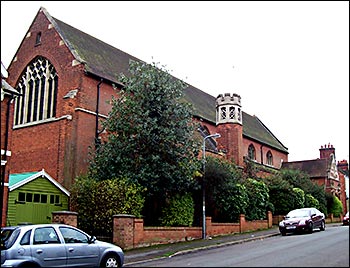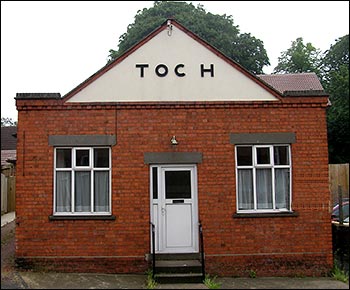|
||||||||
| From an interview with Rae Drage on 3rd June 2008. Transcribed by Jacky Lawrence |
||||||||
|
John Hearn
|
||||||||
|
|
||||||||
|
|
||||||||
|
Well, the Freeman Hardy & Willis shoe shop in Rushden but I don’t know whether you knew what was there before that. I didn’t of course, only from hearsay. There was a block of different architectural, whatever you like to call it, four shops. Obviously they’d been cottages there and they’d been pulled down. Actually the only one I know of before was the Births, Deaths and Marriages Registrar. A Mr. . . now it will come to me later and he operated from there, presumably they pulled it down. Next door was Sammy Webb, who was a saddler, which then led onto Mr. Neville’s. The other side was the, well it’s now the NatWest Bank, the National Provincial I think, there’s another name over the doorway. There was the sixpenny library as we called it, it was the Countryside Library, in fact that’s where I got my first digs was through that place. A certain lady who used to go there regularly and change her books used to put people up. I stayed on firstly at The Westwood Hotel and then she said. 'My man went sometime ago and I feel I would like to have a lodger again.’ So that was the library and then there was a gap through to the Central Cafe. Why they were pulled down in 1930 I don’t know, they rebuilt them and put a flat roof over and I think a sky light. So our people moved there in 1934, course as I say that was 1954 when I came here.
So that’s how I got here and it was a nice little shop. We didn’t, we weren’t over busy, there was only myself and a young lady who was taller than I am. Her name was Ruth Chattle. Yes, I only needed that one but I’m not sure what we did at lunch time. I think we must have closed unless we did it turn and turn about. It wasn’t policy to close as a rule so maybe, no, we just managed with one. I don’t know things were a lot easier in those days, Rushden was a far better, a different place to today. To me I preferred the old one.
Working in the shop I had quite a number of young ladies. I never employed fellows, it was mostly women in shops in those days, even a housewife went to work. I mean the managers, they were men but they sort of went on that road and the mainstream was on the other, well, what else can we say. Yes, I was very well known, well you’ve got to work with people you might as well, you know, I was going to say, live with them almost. Well, we did a little bit of entertainment to help matters along through those two agencies. I don’t know how many branches we had, several hundred and had been a lot more. When I worked in the shop I sold the mens shoes and the ladies sold the ladies shoes. But that was just beginning to go out in the early fifties or the mid fifties rather, just beginning to become civilised and recognised the fact that men and women can be together in all sorts of lines. They had a glass partition down the centre of the shop so the man would be round there. You see, well, the manager he was allowed to go anywhere. I could serve women if I was told to but I think, it was like that more or less. I only served women if I was asked to or told to by the manager, I think that was right. There was a partition in the Rushden shop, yes, that’s right. There was a cash desk in the centre of the shop up against the wall and a till, it was only a draw with a couple of dents in it. It was weird when you think back you know, it really was, but it had been good enough for dad and his dad and his dad so why alter things. Well we did manufacture our own footwear. They’d already got hold of Trueform, I never really understood what was behind the amalgamation of those two, which of course gave us a factory in Northampton, a Trueform factory, opposite Christ Church, I think it was Christ Church which is in Abingdon Park or on the main road going in and I can’t think of the name of the place. It started changing about, in the very early sixties, almost with the decade I suppose, if you could call it that. The old Freeman Hardy head office was at Leicester and we had factories in Leicester and in Northampton and of course were bought in from other places as far as it was necessary. They were made for us, then things started to change. I think they said it was one of the first to suffer with the bombing of Leicester during the war, our place was destroyed overnight, with a fireball. Yes, fortunately it was in the middle of the night so there was only a night watchman on and he fortunately didn’t lose his life. But it meant that we had nowhere to work. We couldn’t do anything so, immediately ,this is a story I’ve always believed, immediately, these factories pulled together and offered this, that and the other. So when I came onto the scene our headquarters was spread across the town of Leicester, and other people were making our shoes, to our specifications of course, and that’s how they got on. So, there was different names on our shelves to what there obviously had been in the old Freeman Hardy. For example ladies wide fitting shoes were Portland. Well, Portland was a good name in those days but we were still selling them then because they had opened their doors and said. 'Come in and what we could do with you to help we will do.' Mens were George somebody, I don’t know. Then onto the scene comes a man with some money and deep pockets who wanted somewhere to invest his money and make a profit quick, whose name was Charlie Clore. And I don’t care what anybody says about Charlie Clore but from a business point of view he couldn’t care less at all whether we were Freeman Hardy & Willis making shoes or whatever else. As long as it brought back a return for his money, there you are and he did a lot of good. I only ever saw him once, we opened a new branch at Welwyn Garden City just before I came here Easter 1954. He came down there, didn’t even ask to see the manager, he got as far as the area manager and that was it. Anybody below he didn’t want to know them and he didn’t. But all the same he did one or two things which ought to have been done years before and weren’t. He started buying up companies that had potential and eventually we turned into the British Shoe Corporation. We were modernised in ‘75 I think it was, yes, 1975. They came to me but I knew there was an idea being floated that we should become modernised, but I didn’t think it would have come when it did. The old man came down, the area manager, and he said. ‘We’re going to modernise you or we’re putting you in for a small mod,’ was his wording. ‘Oh, yes,’ I said, ‘When?’ He said. ‘In two weeks time.’ Well, this was November I said. ‘It’s a bit of a funny time.’ Well, I think that what happened really was the fact that it was now autumn, we were about half way through the year and in their meetings I suppose they looked at it and said. ‘Well, we’ve got, oh, we can’t do that one.’ I think it was Loughborough shop which had been promised a mod but they couldn’t get it because of the Council at Loughborough. They kept holding back, wouldn’t give out permission for this or that or anything else, you see. So if the money, or the plans for the mod, had been passed that money is more or less gone, you see. So, they found they had enough money to do four minor mods instead of two or three and Rushden became one of them. It was Rushden, oh I used to know them off by heart, there was two in London I think and two up our way. Well, there you are so 1975 we did not have a good Christmas. We didn’t do well with what we had but we did but I don’t think we actually ever closed. I think, even in the worst three or four days, did we have any anything less than a rack. We had a rack outside, there was some quite good bargains I know that but we got all sorts of stuff that we’d never seen before. I retired three years early, about eighteen years ago, so that was 1990, think it was ’89. I retired when it was Freeman Hardy & Willis, it was very shortly afterwards, it changed its name. There had been changes working up to that but the name still was there. It gradually changed and then all of a sudden it was no longer Freeman Hardy & Willis, it was Shoe City, I think, which was all a modern business. So they kept carrying on, with one or two different young ladies, but I think it lasted about another four or five years, maybe.
|
||||||||
|
|
||||||||
|
|

